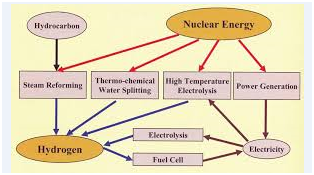eISSN: 2641-936X


Letter to Editor Volume 2 Issue 3
Department of Alumnus with Electrical Engineering, University of Bridgeport, USA
Correspondence: Manu Mitra, Department of Alumnus with Electrical Engineering, University of Bridgeport, USA
Received: May 10, 2018 | Published: October 18, 2018
Citation: Mitra M. Significance of nuclear energy and its complex necessity. Electric Electron Tech Open Acc J. 2018;2(3):261-262. DOI: 10.15406/eetoaj.2018.02.00023
Nuclear energy provides electricity without carbon emissions. It propels and powers our way of life, protecting our homeland security and clean air, providing millions of dollars in economic benefits and a pathway to sustainable development; and that doesn’t ends here. There are still plenty of progress and advances yet to be made. Few of numerous advanced research which will support us advancing to make world a better place.1
A battery with a lifespan that last for decades. Scientists at University of Rochester invented a new fabrication method that in its roughest form is ten times more efficient than current nuclear batteries and has the potential of nearly two hundred times more efficient. This technology is geared toward applications where power is required in inaccessible places and or under extreme conditions (Figure 1).2

Figure 1 Illustrates water based nuclear batteries.7 Image credit: Natalie Burkhard.
Engineering physics researchers at University of Wisconsin-Madison have devised a unique “blanket” that will enable them to squeeze as much electricity as possible from nuclear batteries the size of coarse salt. Nuclear batteries, which exploit the natural power for micro technologies like fly-sized robots for military and medical applications or sensors that monitor a building’s health (Figure 2).3

Figure 2 Illustrates individual nuclear battery module.8 Image credit: Isabel Gueble.
An international team of scientist suggests that we must upgrade our energy production to nuclear energy if we have to accomplish in warding off the worst effects of greenhouse emissions on climate change. The team suggests that beginning in 2020 we could achieve an annual electricity output of around twenty terawatts without needing to develop carbon dioxide trapping and storage technology for the tens of billions of tons of emission that would otherwise drive global warming to catastrophic levels.4
Nuclear Energy has the highest capacity factor of any other energy source. That means nuclear power plants are producing maximum power more than 92% of the time during the year. That’s almost twice as reliable as coal or natural gas units and three to four times more reliable than wind and solar plants (Figure 3).

Figure 3 Illustrates nuclear has the highest capacity factor.5 Image credit: US energy information administration.
Another reason why nuclear energy are more reliable; nuclear power plants are typically used more often because they require less maintenance and are designed to operate for longer sections before refueling (typically every 1.5 or 2 years). Natural gas and coal capacity factors are normally lower due to consistent maintenance and /or refueling at these facilities.5
Scientist at the 243rd National Meeting & Exposition of the American Chemical Society (ACS) on March 27 Ibrahim Khamis, Ph.D., described how heat from existing nuclear plants can be used in more economical production of hydrogen, with future plants custom-built for hydrogen production(Figure 4).

Figure 4 Illustrates production of hydrogen from nuclear energy.9 Image credit: IAEA Vienna.
Khamis confirmed that hydrogen production using nuclear energy could reduce dependence on oil for fueling motor vehicles and use of coal for generating electricity. In doing so, hydrogen could have a beneficial impact on global warming, since burning hydrogen releases only water and no carbon dioxide, the main greenhouse. There is a dramatic reduction in pollution.6
None.
The author declares there are no conflicts of interests.

©2018 Mitra. This is an open access article distributed under the terms of the, which permits unrestricted use, distribution, and build upon your work non-commercially.